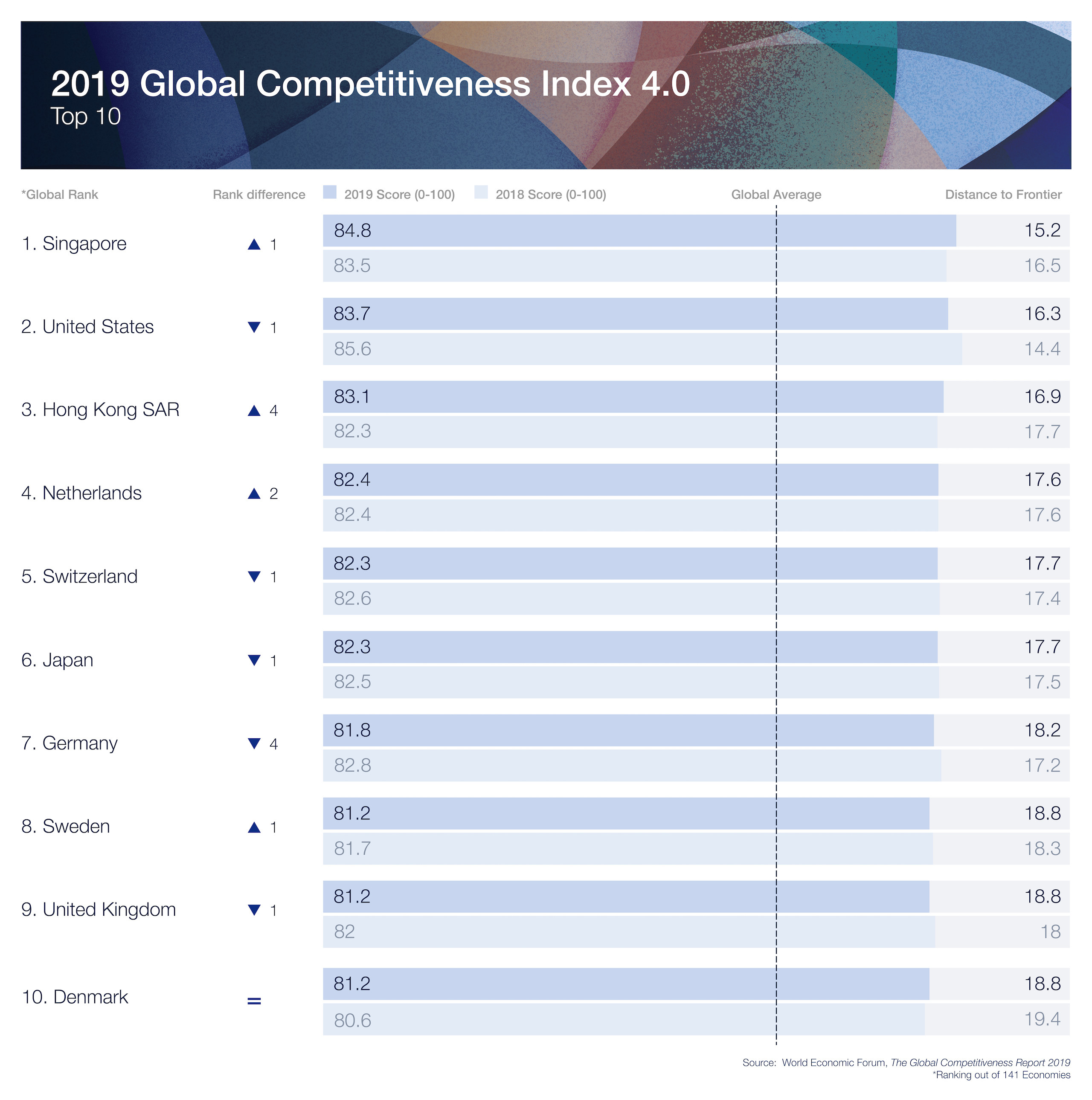European countries top the global talent list of 2020
Switzerland takes the top spot.
Image: REUTERS/Miro Kuzmanovic
Stay up to date:
Future of Work
- European economies take eight out of top 10 spots in 2020 world talent ranking.
- Apprenticeships and employee training are measured alongside education at all levels.Turkey, Estonia, the UAE, Peru and Chile are among 27 economies who improved their performance in 2020.
- Brexit was found to have had an impact on the UK’s position, which slipped to number 23.
A global ranking of 63 countries has found that investing in education at all levels boosts competitiveness by developing and attracting talent.
“Most economies that perform well focus their talent development efforts in every stage of the educational process,” write Professor Arturo Bris and Dr Christos Cabolis of Switzerland’s Institute for Management Development, which has been compiling the IMD World Talent Ranking for seven years.
What do we mean by ‘competitiveness’?
The ranking assesses three factors: investment in and development of home-grown talent; a country’s appeal to overseas talent; and the quality of skills and competencies available.
It includes primary, secondary and tertiary education, as well as apprenticeships and work training.
Here are some highlights:
Switzerland leads the way
Switzerland tops the IMD World Talent Ranking for the fourth year in a row, with top performances for those being channelled into university and starting apprenticeships. “The country is also attractive to foreign labour thanks to the high quality of life and remuneration,” the authors say.
Followed by Denmark
Denmark performs well across the board and stands out for the perceived fairness of its society. For example, it ranks first for implementing justice. It also has the most motivated workforce and prioritizes employee training in the private sector more than any other country.
Luxembourg takes bronze
Luxembourg has consistently improved over the past five years, progressing from 11th to 3rd place in the rankings. This is due to “marked improvement” in investment and development. It leads the table in the total public expenditure on education per student and in the quality of education in primary school – as measured by pupil-teacher ratio.
Top 10 movers
Iceland and Sweden complete the five most competitive economies in terms of talent. Austria, Norway, Singapore and the Netherlands remain in the top 10 with minor fluctuations from last year, while Canada moves up five spots to become the eighth most talent-competitive economy – and one of only two non-European countries in the top 10.
Risers and fallers
Twenty-seven economies improved their performance in the 2020 World Talent Ranking, led by Turkey, up 12 places, Estonia (+8), the UAE (+6), Peru, Chile and Canada (+5). The most significant declines were in Russia (-7), Kazakhstan (-6), Hungary and Saudi Arabia (-5).
The Brexit effect
The United Kingdom’s departure from the European Union appears to be reflected in the talent competitiveness figures, the report says. “In 2016, the year of the Brexit vote, the UK was in 16th position in the same ranking,” the authors note. “This year’s 23rd position is a likely reflection that uncertainties around Brexit have been chipping away at the UK’s talent competitiveness.”
The future of jobs
Skills, reskilling and the future of work are key areas of focus in the World Economic Forum’s Future of Jobs Report 2020. It calls for a shift towards a socio-economic system that is fairer and more sustainable, with social mobility and economic prosperity that does not damage the planet.
“If this opportunity is missed, we will face lost generations of adults and youth who will be raised into growing inequality, discord and lost potential,” the authors say.
The Forum’s Jobs Reset Summit on 1-2 June 2021 will address the most critical areas, develop pathways for action and bring together leaders and organizations to accelerate progress.
This is particularly urgent in the fallout from COVID-19, which has taken a “staggering toll” on lives and livelihoods, the Forum says.
In 2020, the global workforce lost an equivalent of 255 million full-time jobs, an estimated $3.7 trillion in wages and 4.4% of global GDP.
“While vaccine rollout has begun and the growth outlook is predicted to improve, an even socio-economic recovery is far from certain,” the Forum says.
What is the World Economic Forum’s Jobs Reset Summit?
Accept our marketing cookies to access this content.
These cookies are currently disabled in your browser.
Don't miss any update on this topic
Create a free account and access your personalized content collection with our latest publications and analyses.
License and Republishing
World Economic Forum articles may be republished in accordance with the Creative Commons Attribution-NonCommercial-NoDerivatives 4.0 International Public License, and in accordance with our Terms of Use.
The views expressed in this article are those of the author alone and not the World Economic Forum.
Forum Stories newsletter
Bringing you weekly curated insights and analysis on the global issues that matter.
More on Geographies in DepthSee all
Aimée Dushime
April 18, 2025
Samir Saran and Anirban Sarma
April 17, 2025
Nada AlSaeed
April 16, 2025
Zhang Xun and Vee Li
April 8, 2025
Abdulwahed AlJanahi
March 3, 2025
Naoko Tochibayashi and Mizuho Ota
February 28, 2025






